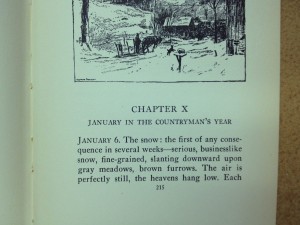“It is not limitation of life that plagues us. Life is not limited: it is the limitation of our awareness of life.”
— Ray Stannard Baker, writing as David Grayson in The Countryman’s Year
Nearly nine years ago, I received a package from a northcentral Ohio reader, Dr. David J. Gerrick. The unexpected surprise was a book published in 1936, The Countryman’s Year.
“I picked up this book on the “used book” rack of our local community college for 25 cents,” wrote Gerrick. “What a treasure. I thought you might enjoy it.”
(Have I mentioned lately how truly wonderful our readers are?)
I was not familiar with the author, David Grayson, which was the pen name for journalist and author Ray Stannard Baker (1870-1946), who wrote for McClure’s and the American Magazine.
At the turn of the 20th century, Baker attracted millions of readers worldwide with his volumes of “Adventures in Contentment” (1907). During WWI, he was a special commissioner of the Department of State and became a close friend of President Woodrow Wilson. In 1919, he was appointed director of the press bureau at the Paris peace conference, and later received the Pulitzer Prize for his eight-volume Woodrow Wilson: Life and Letters (1927-1939).
But back to The Countryman’s Year.
The book is a little like a diary, sharing Baker’s observations of his life on a few acres near Amherst, Mass. Although his life’s work was not as a farmer, in the foreword to this book, he shares this: “Here, I have known the best, I think, that comes to man — times of sight that is also insight.”
He jotted down his thoughts as he worked in his orchards, or with his bees. “Sometimes I have thought: Give me time enough here in this place and I will surely make a beautiful thing.”

I think his philosophical ponderings share meaning still today with anyone connected to the land. All farmers are poets, if only in their thoughts.
“January 10: The best of these fine winter days, when the garden is full of snow, is my morning tramp in my old warm coat, with my stick in my hand. The inner glow, the lift of the mind, as I tread the new snow with the sun coming up over the distant village! Life is good. I ask, indeed, why I am here, what it is all about, and have no answer, and yet how beautiful the wintry trees, how heady the morning air.”Of course, I cheered as I read this from January 17:
“I have enjoyed attending several farmers’ meetings this winter and hearing those sturdy, hardheaded, common-sense men talk of their problems. I think it takes more of a man, more brains, more character, more courage, more bodily vigor, to be a truly successful farmer than it requires in any other calling I know.” “January 22. … One of the sports of our neighborhood is to fight thermometers. We challenge our neighbors: We were 10 degrees below, only to find that they were 12 degrees, and East Street appears with 15 degrees to beat both of us.”The same day’s entry brings this great wisdom about life:
“This I know well: that the chief part of every life consists of small things. If we have not learned how to live with them and enjoy them, we have not learned to live. It is strange how competently, even nobly, many men will ride out the great storms of sorrow and tragedy, who are wrecked upon the little reefs that litter the calm waters of their daily lives.”I experienced that great joy in small things over the holidays during many days of family gatherings and laughter with friends. But if I could capture just one moment, it would be the day after Christmas, sharing dinner with my husband and two children, (at ages 22 and 24, I guess I have to call them adults.).
We sat at the dinner table for more than two hours — just the four of us — laughing at each other, daring to dream dreams. We sat amid the dirty dishes, for to move would break the spell.
Baker adds: “Blessed is the man who can enjoy the small things, the common beauties: the little day-by-day events, sunshine on the fields, birds on the bough, breakfast, dinner, supper: the daily paper on the porch, a friend passing by. So many people who go afield for enjoyment leave it behind them at home.”
The book truly is a gem, and I am indebted to Dr. Gerrick for sharing it (and am embarrassed for taking so long to soak up its warmth). Sometimes, we have hard lives out in the countryside or on the farm. But we are surrounded by riches. And it is enough.













